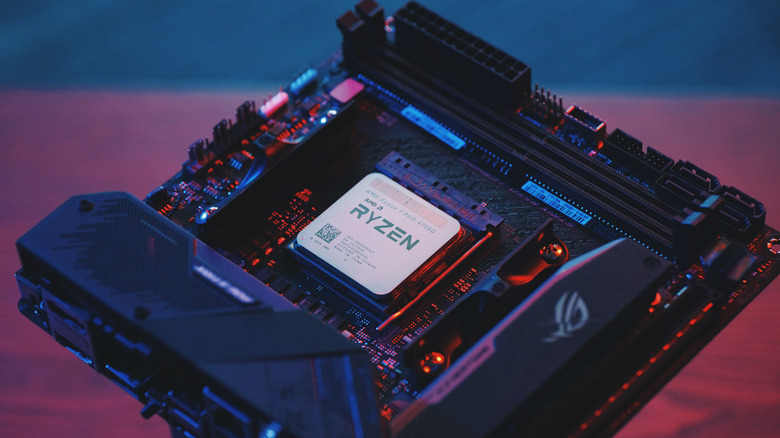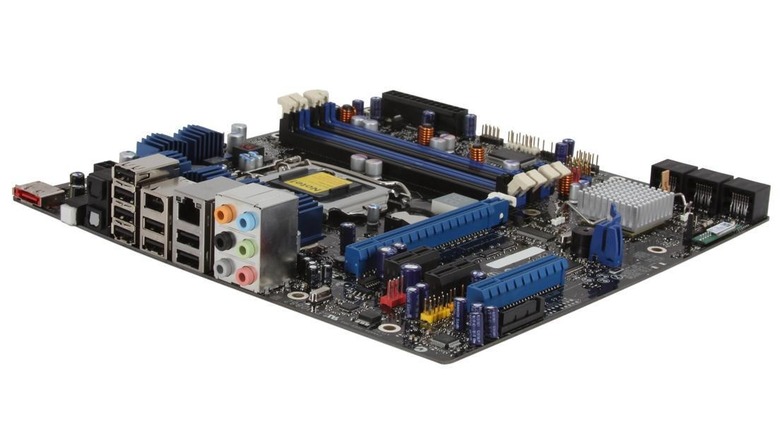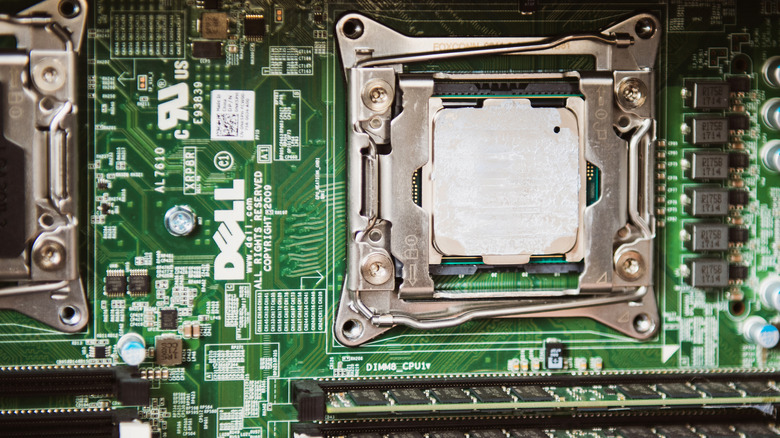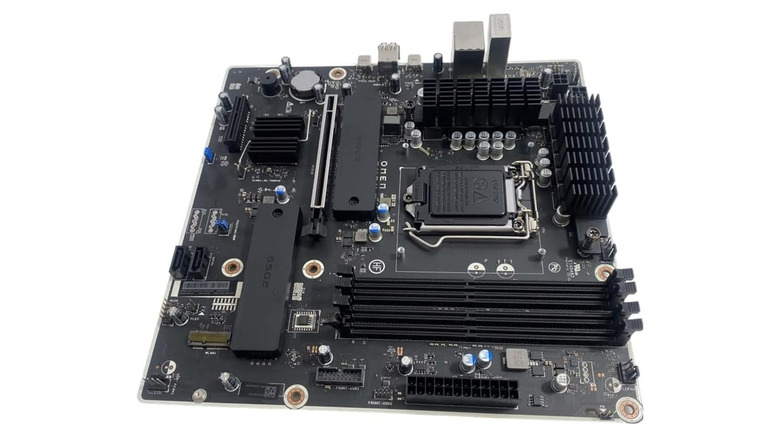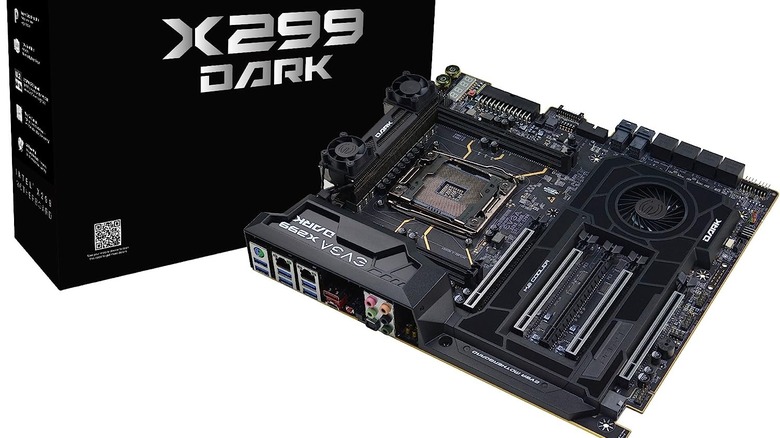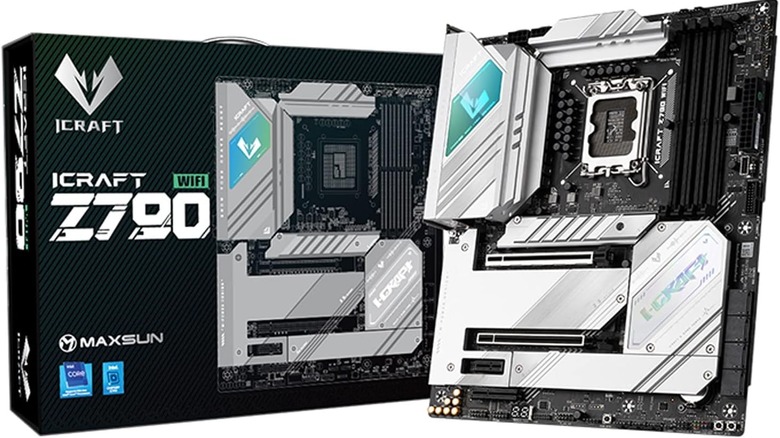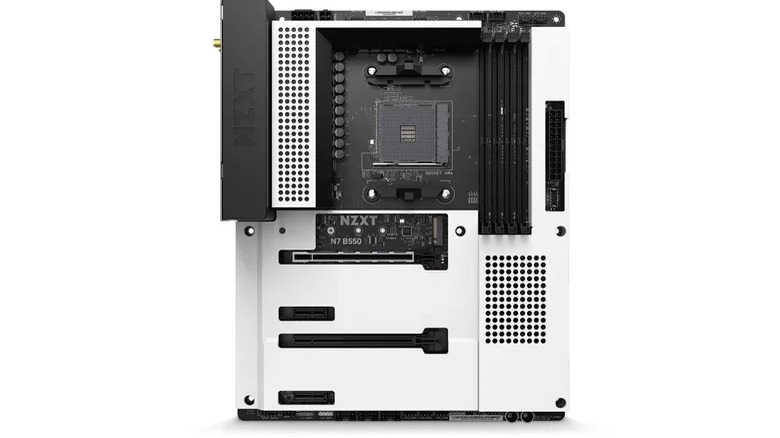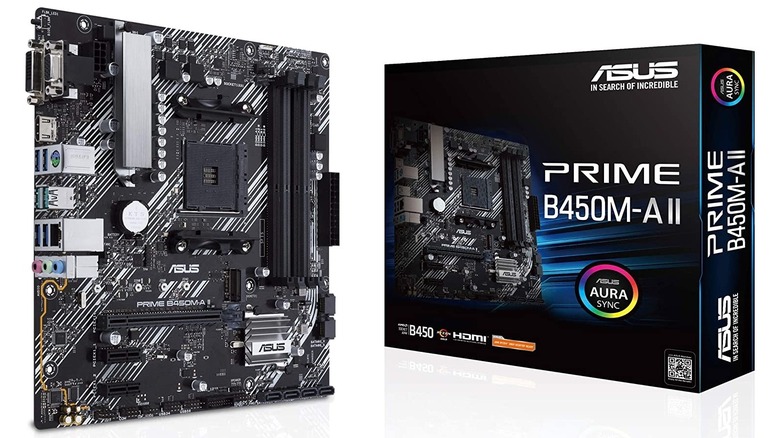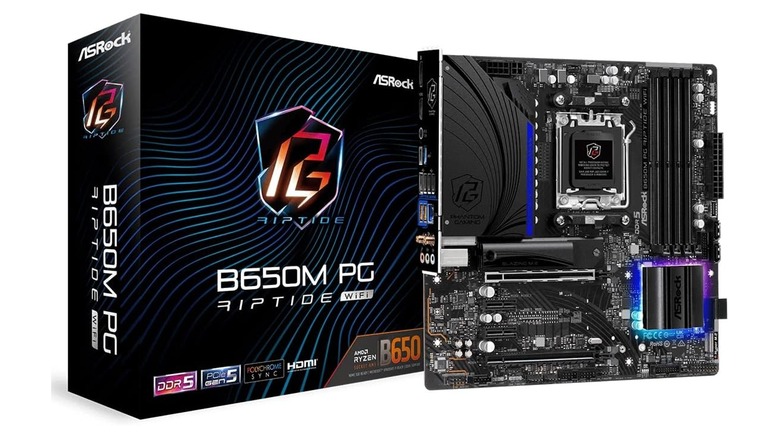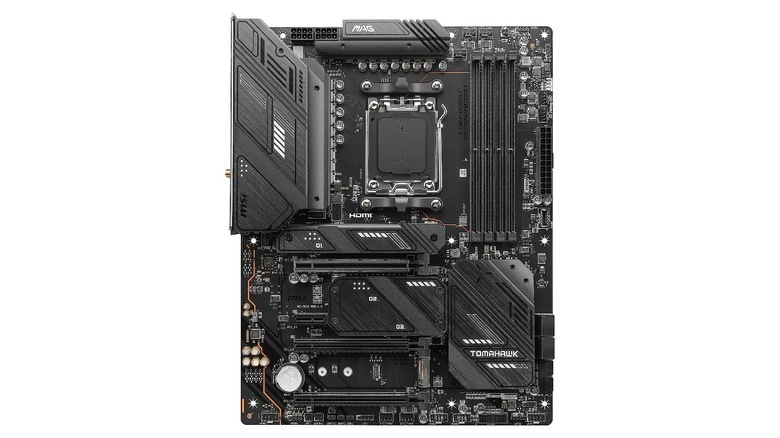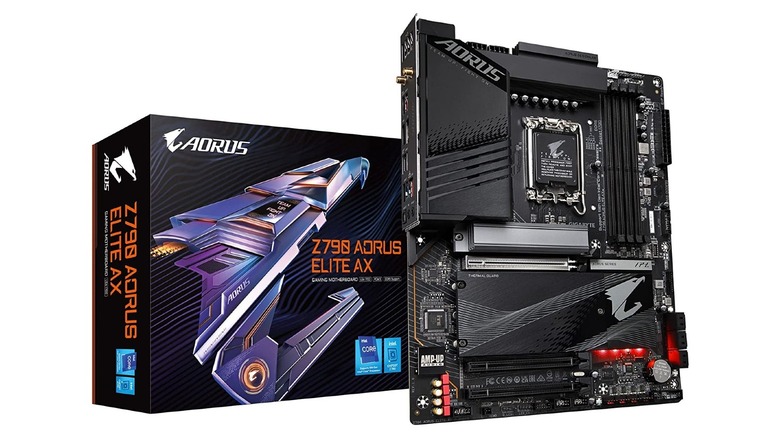Major Motherboard Brands Ranked Worst To Best
We may receive a commission on purchases made from links.
When buying parts for a PC build or upgrade, the motherboard often gets overlooked. While it's true that the CPU, GPU, and even an SSD can have a larger impact on performance, the simple MoBo still plays a vital part. It ties everything together, dictates whether future upgrades are simple affairs or closer to a total rebuild, and can ensure you get the most out of the more expensive, glamorous, parts.
While your main concern is likely (and should be) about your board's compatibility with other parts you have or intend to buy, there is a lot more to think about. The board's manufacturer is an important consideration. While there is overlap between certain brands, different manufacturers offer different hardware, so your choices will be limited if you need something very specific, like a laptop board.
In the mid-range and at the high-end, you have a few options, and other manufacturers offer more basic boards at an attractive price. Alongside reputation, the level of customer service available should also play into your choice. Things have also changed since 2022. Some established brands aren't what they once were, while smaller manufacturers have managed to carve out a decent reputation. Here's where we believe 10 major motherboard manufacturers rank in descending order.
10. Intel
Intel is one of the biggest names in computer hardware, though if you ask most people what the company makes, they'll only be able to say processors. Slightly more knowledgeable people may also say something about RAM or Wi-Fi cards, but very few will say motherboards. Around a decade ago, Intel decided to wind down its motherboard manufacturing operations. The company instead prefers to supply chipsets to other manufacturers, such as ASUS, MSI, et al.
Despite this, Intel does still manufacture some boards, though they're unlikely to be the kind any home PC builder will use. Instead, these are bare-bones pieces of kit designed for older systems. In light of that, unless you're overly enthusiastic about using a Pentium Processor and a couple of sticks of DDR2 RAM in your build, we wouldn't recommend one of Intel's in-house boards.
While the boards are an absolutely terrible choice for anyone building a modern rig, they do still serve a purpose. Older hardware is still in use all around the world, serving its purpose adequately, and maintaining it with parts like these is cheaper and easier than upgrading it to something modern. Intel ranks last on our list because, while its chipsets are the basis for some of the best boards around, it only produces a limited amount of pretty obsolete tech in-house.
9. Dell
While you may not think of Dell as a motherboard manufacturer, the tech company does make several of its own boards — though not for the reasons you might think. You could, probably, use one to build a PC, though you may have to get comfortable with soldering and heavily modifying your case. Either way, it's a bad idea and not what Dell's boards are meant for at all. There are also older Dell boards still on the market if you're determined to get one in a PC, though support was likely withdrawn for them years ago, so you're probably on your own if something goes wrong.
The boards Dell still manufactures and sells are designed for its laptops, and most of them are shaped to fit into a particular model. They're intended to be replacements people can use to replace the boards in their laptops should they become damaged. They are also priced as you may expect specialist parts to be, as in they're very expensive for what you actually get. Dell can do this as you don't really have many other choices: it's either pay what the company's asking, try to salvage a second-hand part from a used laptop, or just abandon the idea of repairing your machine altogether.
Dell also used to make full-sized motherboards but abandoned the practice several years ago. You may still be able to find an old one online, but you'd be buying a fairly obsolete piece of technology. Dell places ninth on our list because the boards it offers are relatively modern, but are only useful to a small niche of people.
8. HP
As far as computers go, HP is better known for its laptops and pre-built desktops. It does sometimes make its own motherboards for those desktops, though, and said motherboards can be found on Amazon. They're usually refurbished and designed for an older Intel chipset, so we can only imagine they are meant for people who want to spend around $150 to keep their old desktop alive rather than someone wanting to build a new rig. While HP's boards had some moderately decent components a few years ago, you shouldn't expect anything fancy from the Californian company these days.
Still, if for whatever reason you really want an HP motherboard, you can use one as the basis for a custom-built PC. You'll just need to make sure parts like the processor and RAM are compatible with your board choice, and your rig will likely be fairly obsolete compared to something you could build on a different manufacturer's board for a similar price. Replacement motherboards for HP's range of laptops are also available to buy, and despite the relatively high prices, this may be a better option than scrapping a broken laptop. Beyond this, it would be silly to consider purchasing one of HP's boards. The manufacturer ranks eighth in our list because, while the HP boards on the market appear to be salvage jobs, there is still more variety present than what the manufacturers in the ninth and 10th slots offer.
7. EVGA
As of July 2023, it turns out that EVGA may stop manufacturing motherboards, just as it recently stopped manufacturing GPUs. That would be a real shame, as the Taiwanese company's hardware has historically been very decent. If the company folds entirely or doesn't maintain stockpiles of parts, then warranties could be a worry when purchasing an EVGA board. If you do decide to take the risk and nab what may soon be a Bonafide collector's item, then you might not be disappointed. With that said, at the time of writing, supplies of EVGA boards seem to be limited at several major online retailers.
This could be a hangover from events like the coronavirus pandemic and global chip shortage that saw supplies dwindle and prices skyrocket, or it could be a further indication that all is not well in the EVGA camp. EVGA tends to offer the same range of products as every other high-end manufacturer. You'll find plenty of cheap, basic options alongside extreme high-end offerings and everything in between.
Recent reviews on sites like NewEgg include some indication that quality control is becoming an issue with EVGA's boards, and customer service may not be on point — though other major manufacturers have similar reviews attached to their products, so a fair pinch of salt must be taken when reading them. EVGA is fairly low on our list but would have ranked nearer the top just a few years ago. There's always a chance the company will turn things around and get back to its glory days, but you should probably give it some thought and a lot of research before pulling the trigger on one in 2023. The uncertainty has left EVGA seventh on our list.
6. MAXSUN
MAXSUN is a brand of motherboards you probably haven't heard of unless you've spent a lot of time building PCs in China. Still, the company's products are available outside of its homeland and can be significantly cheaper than equivalent boards from better-known manufacturers. In terms of quality, the fact it is made in China shouldn't be seen as a negative. Most of the hardware better-known brands use is also made there.
The boards themselves look very similar to other modern offerings, so expect plenty of beefy heatsinks covering the board itself. Like many of the cheaper brands, it doesn't appear to be offering anything based on AMD's AM5 chipset at the time of writing — though this is likely to change as time goes on. Most of their output tends to be built around the last generation's chipsets, and the average price for a MAXSUN motherboard is under $200, which is where many believe all motherboards should still be priced.
If you're rocking an Intel CPU, then MAXSUN does have offerings based on the Z790 chipset, like the MAXSUN iCraft Z790 WiFi Gaming Motherboard. You can then put the money you save on this toward hardware that can actually take advantage of a PCIe 5 port (like a very expensive SSD). While MAXSUN is an emerging brand in the West and its motherboards will likely meet its customers' needs, it's still not established enough to force its way above some of the bigger names on the motherboard scene. It sits in sixth place, but that could change in the future.
5. NZXT
NZXT may be better known for its cases, fans, and power supplies, but the PC parts company also produces a line of motherboards for both Intel and AMD processor-based systems. In terms of price, NZXT's motherboard offerings are firmly in the mid-range, hovering somewhere between $200 and $300. It is worth noting that at the time of writing the company has yet to release a board that uses AMD's X670 chipset, so you're out of luck if you have a 7000 series AMD processor and want a PCIe 5 port. It does, however, offer a Z790 board for Intel users, and AMD boards in general are a recent addition to the brand.
The main selling point of NZXT's boards seems to be their styling, which matches the manufacturer's cases and other parts. This includes boards with white heatsinks, which should please gamers going for an all-white build. Beyond the styling, there doesn't seem to be anything that makes NZXT's boards stand out, and as mentioned, the company is better known for the other parts it produces.
That's not to say the boards are unreliable or bad in any way, but you may want to spend your money elsewhere if you're building a gaming rig and don't care too much about the color scheme matching. NZXT is a well-established brand with a reasonable selection of motherboards on offer. If you do encounter problems, there's a good chance you can have them resolved in a reasonable manner, hence its place in the middle of our pack.
4. ASUS
If we'd written this at the start of 2023, there's every chance ASUS would be on top of the list. Over the years, the company had built up a reputation for delivering high-quality hardware aimed at gamers and enthusiasts. Boards sold under its Republic of Gamers (ROG) label (like the ASUS ROG Strix Z790-E) were particularly good choices if you were looking to get the most out of your rig, and options spanned from cheaper boards in the $100 to $200 range to Crosshair boards, which can cost over $1,000 if you're aiming for one on the latest AMD chipset. These boards are, for the most part, overkill for most gamers but a solid choice if you're looking for a platform you can upgrade for years, absolutely have to cram all of the latest tech into your rig, or take overclocking to extremes.
Unfortunately, the high-end motherboard manufacturer managed to destroy all it had built in a few short weeks. There were well-publicized issues some motherboards, including ones made by ASUS, had with AMD's Ryzen 7000 series processors. A firmware issue led to some boards overloading the processors, which led to a fire in several cases, destroying both the board and processor. The issue itself has hopefully been resolved thanks to a firmware update that puts a firm cap on the voltage the processor can draw, but that's not the only issue. ASUS reportedly gave many customers a hard time when it came to support, replacements, and the coverage its warranty provides. This too was rolled back and the warranty was clarified — but it may take many people a long time to forgive and forget in this case. ASUS places fourth in our rankings.
3. AS Rock
AS Rock isn't a high-end parts supplier by any means; it's quite the opposite. The company has built its reputation by making cheap, no-frills boards that just work — like the ASRock B650M PG Riptide WiFi you see above.
Overselling motherboards seems to be a common thing in the modern PC parts market — but if you sit down and think about what you actually need, then a basic motherboard is likely ideal for your build. We're a few years away from PCIe Gen 5 becoming relevant to M.2 storage, and GPUs aren't even capable of taking PCIe Gen 4 to its limits. You also don't need 18 power stages unless you're heavily into overclocking. The money you'd spend on a board with these high-end features could instead be put toward parts that will actually make a difference in performance, like a better processor or GPU.
Reliability isn't easy to gauge, as companies tend to keep data on failure rates private, but theoretically the more basic the board, the less there is to go wrong. So again, AS Rock may be onto something with the niche it's carved out. If we're going off Amazon reviews alone, customers seem to be very happy with the budget board maker. In short, don't let the fact it's not a big name put you off. If you're not going for an ultra-high-end build with enthusiast-level parts, AS Rock is a very good choice of motherboard manufacturer. It places third, behind two companies offering a wide range of options and doing so very well.
2. MSI
MSI used to have a bit of a hit-and-miss reputation, but the company's hardware has improved drastically over the last few years. Its motherboards also have the coolest names of any mainstream manufacturer and tend to share their tags with weapons. If you want to say your PC is built on a "Mortar" or a "Tomahawk," then you should probably base your build around an MSI board like the MSI MAG Z790 – or the AMD version with the MSI MAG B550 Tomahawk MAX
Where MSI's products really stand out is in the customization and control department. Tools like MSI Center, Mystic Light, and Afterburner make controlling things like RGB lighting and fan speeds a doddle. The BIOS is also fairly easy to navigate should you wish to do something a little bit more complex. In terms of offerings, MSI has boards ranging from basic to enthusiast.
While it offers equivalent boards to other major manufacturers like Gigabyte and ASUS, MSI's boards can sometimes be found slightly cheaper than its rivals — which is a massive bonus. This is excluding the MEG, which falls into the same crazy "$1,200 board that no one actually needs" category as the Gigabyte AORUS Xtreme and ASUS Maximus. But to be honest, if you're spending more than the MSRP of an NVIDIA GeForce 4080 on a motherboard, you need more help than this article can provide. While we've put MSI second, it may be the best option for your particular build, so do some heavy research before making your choice.
1. Gigabyte
Gigabyte is one of the bigger names when it comes to PC parts, and it is currently at the top of our list when it comes to motherboard manufacturers. If you browse Reddit, you'll probably come across comments that question Gigabyte's reliability and contain accusations relating to a decline in quality over the years. You'll also see similar comments on every other major manufacturer's pages. Complaints tend to get more press than compliments, and motherboards can sometimes shoulder the blame when a build has other issues or the person building the PC has messed something up in the BIOS. We'll concede that Gigabyte isn't perfect, but it is the best mainstream motherboard manufacturer as of 2023.
At the top of the pile when it comes to Gigabyte's boards is the AORUS series, which offers a range of versatile components for enthusiasts and pro gamers with boards like the GIGABYTE Z790 AORUS Elite AX. AORUS boards feature robust power delivery systems, and tech in the BIOS that makes overclocking a lot easier. If you're not a gamer, Gigabyte also offers the Aero series of boards which are designed to meet the needs of creators and streamers. Each label offers a range of boards, ranging from relatively cheap to over $1,000. There are also standard boards available for under $100 if you're aiming for a budget build. There isn't a lot between a Gigabyte board and any of the other established brands offering wide selections that include high-end products. However, its long legacy as a quality parts manufacturer and lack of recent controversies have secured it a place at the top of our list.
